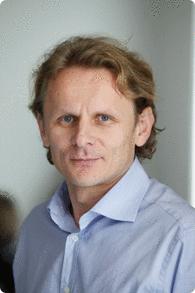CCB seminar Wednesday the 26th of September at 12.00 hrs Professor Dr. Ivan Dikic

Centre for Cancer Biomedicine (CCB) welcomes you to a research seminar on Wednesday the 26th of September at 12.00 in the Auditorium in the Research Building, the Norwegian Radium Hospital.
Professor Ivan Dikic from Buchmann Institute for Molecular Life Sciences at Goethe University, Frankfurt will give a talk on the following subject: ”Ubiquitin networks in regulation of inflammation and autophagy”.
Ubiquitin networks in regulation of inflammation and autophagy
Abstract
An increasing number of distinct functions have been assigned to different types of ubiquitin modifications (mono ubiquitin versus ubiquitin chains). In these processes Ub acts as a signalling component able to trigger molecular events in cells. Structural studies have revealed significant differences between ubiquitin chains of Lys48, Lys63 and linear linkages. We have recently shown that the UBAN domain of NF-êB essential modulator (NEMO) binds specifically to linear Ub chains and that this step is both required and sufficient for NF-êB activation. These findings explain the detrimental effect of NEMO mutations in patients suffering from X-linked ectodermal dysplasia and immunodeficiency. More recently, we have identified novel components of the linear ubiquitin assembly complex (LUBAC) that catalyse linear ubiquitination of NEMO and control the NF-êB and apoptotic pathways downstream of TNF receptors.
Removal of harmful protein aggregates, damaged organelles and microbes is mediated by autophagy, a process by which the cell sequesters cytosolic cargo and delivers it for degradation by the lysosome. We have recently identified Optineurin as a new autophagy receptor, which together with p62 and NDP52, mediates selective autophagy of ubiquitin-coated cytosolic Salmonella enterica. The protein kinase TBK1 (TANK binding kinase 1) was shown to bind to and phosphorylates Optineurin on serine 177 enhancing LC3 binding affinity and autophagic clearance of cytosolic Salmonella. Conversely, ubiquitin- or LC3-binding Optineurin mutants and silencing of Optineurin or TBK1 impaired Salmonella autophagy resulting in increased intracellular bacterial proliferation. TBK1-mediated phosphorylation of both LC3- and Ub-binding domains ensure a rapid engulfment of cytosolic bacteria and efficient autophagic clearance thus representing a general mechanism for regulation of cargo-selective autophagy.
Ubiquitin chains modify major parts of the proteome but information regarding localization and dynamics of these signals remains sparse due to the absence of appropriate tools to study them. We have employed fluorescent sensors based on selective ubiquitin-binding domains to monitor linear and K63-linked ubiquitin chains in vitro and in cells. GFP-tagged UBAN sensors selectively recognize linear chains, whereas the UIM (Ubiquitin-interacting motif) of Rap80 and the NZF (Npl4 zinc finger) domain of TAB2 act as selective K63-ubiquitin sensors. Linear sensors labeled the ubiquitin coat surrounding cytosolic Salmonella during bacterial autophagy, whereas K63-sensors were used for selective monitoring of DNA double strand breaks and Parkin-induced mitophagy. Biosensors based on specific Ub- or UBL-binding domains can thus be used to monitor localization and function of ubiquitin chains and ubiquitin-like signals in vivo.
Link:
Announcement from CCB home page
